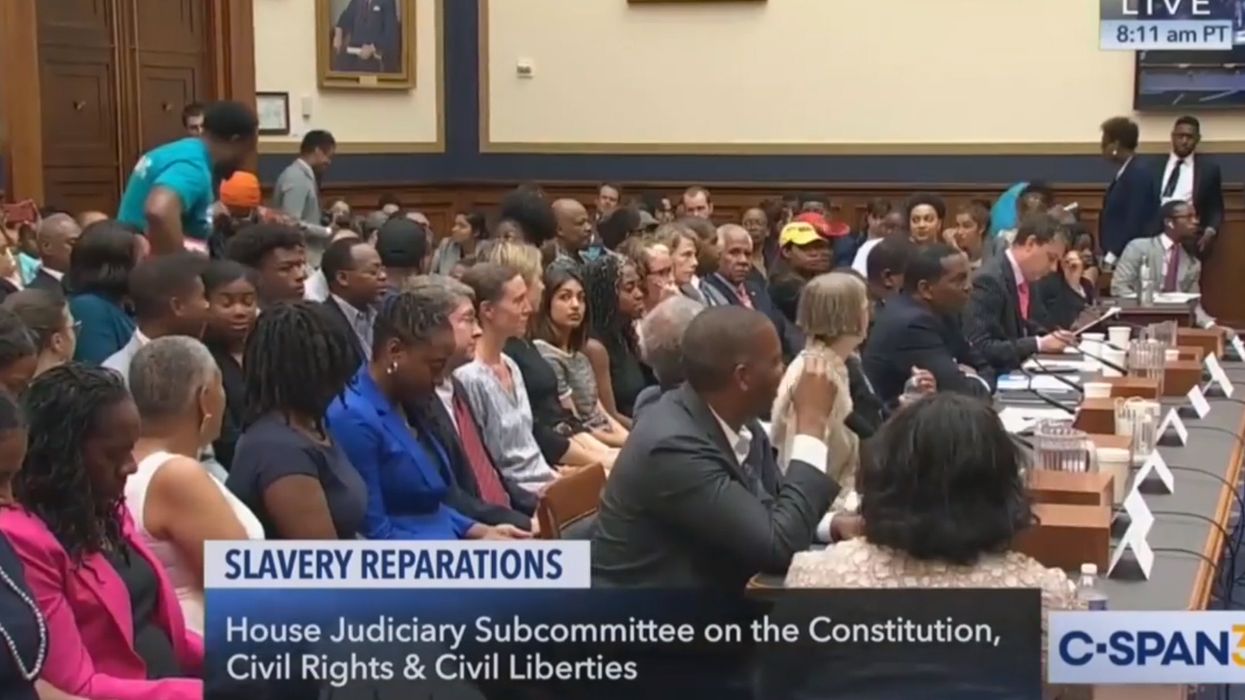
Image source: C-SPAN screenshot

Image source: C-SPAN screenshot
The reparations hearing started out contentious and stayed there
The House had a hearing Wednesday on the topic of reparations for slavery, and it was unruly more than once. In particular, things turned chaotic after a columnist for Quilette, who has written for National Review and Spectator, and who is African American, spoke in opposition to reparations.
His dissent was not well-received. In fact, the chair had to gavel for order.
That writer, Coleman Hughes, told the House Judiciary Committee's Subcommittee on the Constitution, Civil Rights, and Civil Liberties that he knew his speaking wouldn't be well-received in his opening statement.
"Nothing I'm about to say is meant to minimize the horror and brutality of slavery and Jim Crow," he began his remarks. He talked about how the bill under consideration mentions slavery 25 times, but "incarceration only once," and said that it is addressing issues of the past perhaps at the expense of the issues of today.
Even as those in the room were already negatively reacting out loud to his commentary, Hughes pointed out that he was advised against testifying.
"Nearly everyone close to me told me not to testify today. They told me that even though I've only ever voted for Democrats I'd be perceived as a Republican, and therefore hated by half the country. Others told me that by distancing myself from Republicans I would end up angering the other half of the country," he said. "And the sad truth is that they were both right. That's how suspicious we've become of one another. That's how divided we are as a nation."
"If we were to pay reparations today, we would only divide the country further making it harder to build the political coalitions required to solve the problems facing black people today," he continued. "We would insult many black Americans by putting a price on the suffering of their ancestors. And we would turn the relationship between black Americans and white Americans from a coalition into a transaction. From a union between citizens into a lawsuit between plaintiffs and defendants."
"What we should do is pay reparations to Black Americans who actually grew up under Jim Crow and were directly harmed by second-class citizenship. People like my grandparents," Coleman said, refining his point. "But paying reparations to all descendants of slaves is a mistake."
He used his own situation as an example, saying that even though he grew up decades after Jim Crow in a "privileged household" and attends an Ivy League school, reparations would be allocated to him.
"You might call that justice, I call that justice for the dead at the price of justice for the living," he said.
As he spoke, people in the room audibly objected and contradicted him several times. After he finished and said the bill was a mistake, he was widely booed.
The chairman of the hearing, Democratic Rep. Steve Cohen (Tenn.), banged the gavel for order, saying, "Chill, chill, chill, chill."
Cohen then said of the young black writer who spoke of his enslaved ancestors that "he was presumptive, but he still has a right to speak."
The disruptions continued, to include laughter and mocking. One person got up and left the room, and Cohen said "every witness here should be treated with respect," which apparently includes talking down to a witness with personal interest as being "presumptive" (by which one assumes Cohen meant "presumptuous").
It was a chaotic scene, and an indication of how the Democrats will be treating the issue going forward.
Caleb Howe
Contributor